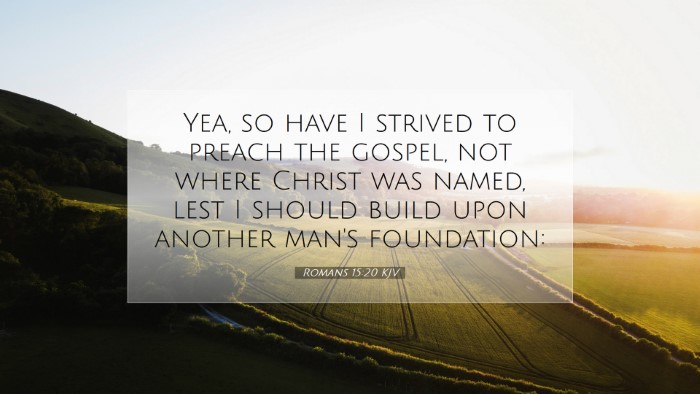Commentary on Romans 15:20
Romans 15:20 states, “And thus I make it my ambition to preach the gospel, not where Christ has already been named, lest I build on someone else’s foundation.”
This verse encapsulates the Apostle Paul’s missionary zeal and strategic approach to spreading the gospel of Christ. The nuances embedded in this text offer profound insights into the nature of evangelistic work and its implications for ministry.
Contextual Background
Understanding Romans 15:20 requires an appreciation of its place within the epistle. Paul's letters to the Romans underscore themes of grace, justification, and the implications of faith in Christ. By the time of this writing, Paul had already established a significant presence among various churches and had laid a systematic theological foundation.
His ambition to reach unchartered territories reflects not only a strategic ministry model but also a profound commitment to the mission assigned to him by Christ. The broader context reveals a church grappling with diversity, identity, and outreach in a multicultural environment.
Analysis of Key Elements
-
Ambition: Paul’s ambition is a driving force throughout his ministry. According to Matthew Henry, ambition in this context is not motivated by pride but by a genuine desire to glorify God by bringing salvation to those who have never heard the gospel.
-
Preach the Gospel: The act of preaching implies more than mere verbal communication. Albert Barnes articulates that preaching the gospel encompasses the full proclamation of Christ’s life, death, and resurrection, which must be the central message of Christian ministry.
-
Not Where Christ Has Already Been Named: Paul’s mission strategy to avoid building on another's foundation speaks to a respect for the work that others have done. Adam Clarke emphasizes that this principle not only affirms different roles in the Body of Christ but also signifies the importance of expanding the reach of the gospel into places devoid of its message.
-
Foundation: The metaphor of a foundation serves to highlight the necessity of establishing a solid and original ministry. Paul saw himself as a master builder, drawing reference from 1 Corinthians 3:10, where the foundation is only laid on Christ. His endeavor was to ensure that his converts were firmly rooted in true biblical doctrine.
Theological Implications
The theological implications of Romans 15:20 resonate profoundly in contemporary church practices. Paul’s focus on pioneering efforts can be seen as a model for evangelism that prioritizes reaching the unreached and fostering new conversions over reinforcing established congregations. This challenges churches today to consider their approach to missions and outreach.
Mission and Evangelism
The missional approach Paul exemplifies urges believers to identify areas and groups that have yet to receive the gospel's transformative truth. It challenges churches to mobilize resources, develop strategic partnerships, and engage in areas of need, echoing the Great Commission in Matthew 28:19-20.
Respecting Existing Foundations
Paul’s admonition to avoid building on another’s foundation calls for a spirit of unity and collaboration among the body of Christ. In our current age, where denominational divides can foster competition, Paul's strategy sports an attitude of cooperation—encouraging churches to work alongside existing ministries rather than in opposition or competition.
Pastoral Applications
For pastors, Romans 15:20 serves as a reminder of their calling to evangelism and decision-making in ministry settings:
-
Evaluating Ministry Focus: Pastors should regularly assess whether their primary focus aligns with the Great Commission and actively seek to engage with those who do not know Christ.
-
Encouraging Pioneer Missions: Encourage church members to engage in or support missions in areas lacking Christian witness, fostering a culture of outreach and service.
-
Collaboration in Ministry: Promote a spirit of collaboration where congregations can partner rather than compete, paving the way for a more unified body of Christ.
Conclusion
Romans 15:20 is a clarion call for believers to adopt a mindset that goes beyond maintenance of existing grounds but seeks to plant new seeds of faith. The principles gleaned from this verse are essential for pastors, students, and theologians alike, as they emphasize an active, intentional, and cooperative approach to evangelism. As Paul demonstrated in his lifetime, the ambition to refuse to build on another's foundation is not merely a personal decision but a theological stance that affirms the dynamic and unprecedented nature of the gospel's reach.


